新修辞学理论1总论
现代修辞学

现代修辞学目录第一章修辞概说第一节修辞的意义第二节修辞的含义及定义第三节修辞学研究的范围第二章修辞和语境的关系第一节语境赋予修辞以确切含义第二节语境决定修辞同义手段的选择和运用第三节语境决定修辞的优劣第四节语境和修辞的关系给我们的启示第三章修辞学的性质第一节修辞学不属于纯语言学而属于大语言学第二节修辞学不属于科学部门而属于艺术部门第三节修辞学是一门边缘科学第四章词语选择第一节声音的配合第二节词语意义的锤炼第五章句式选择第一节常式句和倒装句第二节陈述句和反问句第三节疑问句和祈使句第四节肯定句和否定句第五节主动句和被动句第六节长句和短句第七节紧句和松句第六章准语言的运用第一节准语言在交际中的作用第二节准语言的产生第三节准语言的特点第七章叙述方法的选择第一节正叙第二节倒叙第三节平叙第四节插叙第八章修辞选择的角度和应注意的问题第一节修辞选择的角度第二节修辞选择应注意的问题第九章修辞格的运用第一节修辞格的定义和命名辞格应注意的问题第二节比喻第三节比拟第四节比拟和比喻的同与异第五节移就第六节移就和比拟的区别第七节通感第八节通感和移就的同与异第九节通感和比喻的同与异第十节夸张第十一节移情第十二节移情和拟人的同与异第十三节借代第十四节借代和借喻的同与异第十五节跳脱第十六节双关第十七节双关和借喻的区别第十八节婉曲第十九节婉曲和双关的区别第二十节反语第二十一节拈连第二十二节拈连和比拟的区别第二十三节反饰第二十四节移姓第二十五节量词移用第二十六节相反相成第二十七节相反相成和反饰的区别第二十八节转品第二十九节拆词第三十节易色第三十一节仿词第三十二节同异第三十三节同异和仿词的区别第三十四节衬托第三十五节反衬和对照的区别第三十六节自言相违第三十七节自言相违和反饰、相反相成的区别第三十八节对偶第三十九节对照第四十节对照和对偶的区别第四十一节迭现第四十二节示现第四十三节摹绘第四十四节回避第四十五节呼告第四十六节呼告和拟人的区别第四十七节排比和层递第四十八节反复第四十九节反复和排比的区别第五十节顶真第五十一节回环第五十二节回环和顶真的区别第五十三节回环和回文的区别第五十四节错综第五十五节设问第五十六节反问第五十七节反问和设问的区别第五十八节成语活用第五十九节飞白第六十节别义释词第六十一节数代第六十二节同形第六十三节同词转跌第六十四节杂混第六十五节修辞格的综合运用第六十六节表层修辞和深层修辞第六十七节对修辞格荷载信息的理解及其欣赏第十章语言风格第一节语言风格及其要素第二节风格的属性和特点第三节风格的基本类型第四节风格的稳定性和变移性第五节风格的评价后记修订版后记。
[重点]麦克卢汉的新修辞学理论
![[重点]麦克卢汉的新修辞学理论](https://img.taocdn.com/s3/m/7fc8571a6d85ec3a87c24028915f804d2a168740.png)
加拿大著名传播学家麦克卢汉在《理解媒介》一书中提出了媒介即是讯息的理论,媒介在人们的理解中只不过是传播工具,在麦克卢汉的理论中,媒介的感念的内涵和外延是与通常的理解存在着差异的。
只有正确的理解麦克卢汉的媒介的概念,才能理解媒介即是讯息的观点。
本文认为,在麦克卢汉认为,媒介是那些延伸人类器官的所有工具、技术和活动,它的范围是很广泛的;媒介即是讯息包含着这样含义:一,一种媒介的产生会在社会中产生新的行为标准和方式;媒介(技术)创造了新的环境而环境又影响很大着人们的生活和思维方式。
二,媒介之间是互相关联的,一种媒介注定是另一种媒介的内容。
媒介即是讯息的理论在指导大众传媒的实践中具有重要意义。
关键词:媒介讯息麦克卢汉传媒加拿大著名的传播学家麦克卢汉在20世纪60年代出版了《理解媒介》一书,这本书的出版在世界范围内产生了广泛的影响。
在该书中麦克卢汉以全新的视角阐述了媒介的概念,提出了许多具有突破性的观点和理论,它的主要观点是:媒介即是讯息;任何媒介都使人体的延伸;人类世界将会成为“地球村”。
这些观点影响着人们对科技、媒介和生活方式的理解,在众多领域具有启发性。
其中,媒介即是讯息的理论是令人难以理解的,很多人对这个观点认识不清,不明白作者的真正的含义和作者提出这个观点的角度。
对媒介即是讯息的观点进行正确的理解,可以有助于我们对大众传媒的实践活动的开展。
理解媒介即是讯息的观点首先要正确理解麦克卢汉思想中媒介的概念,这样才能够准确的理解媒介即是讯息的理论,麦克卢汉的媒介概念是和通常的媒介的概念是有着区别和联系的。
一麦克卢汉所提出的媒介是人类器官延伸的一切工具和技术,广义的可以理解为人类所利用的一切工具。
对媒介的定义是大同小异的,一般认为媒介就是人们传播信息的工具。
在《理解媒介》一书中麦克卢汉提出了媒介是人类器官的延伸,换个表达法就是人类器官的延伸就是媒介。
在这里逻辑上是成立的。
同时,麦克卢汉在书中提到了26种媒介,其中包括货币、时钟、游戏、武器等等。
学术思想与研究路径新修辞学与批评话语分析的异与同

框架:批评话语分析主要包括文本分析、话语分析、语篇分析等,通过对文本、话语、语篇 的分析,揭示其背后的社会、文化、政治、经济等背景。
研究方法:批评话语分析主要采用定性和定量相结合的研究方法,通过对文本、话语、语篇 的深入分析,揭示其背后的社会、文化、政治、经济等背景。
关系
理论框架和研究路径的异同点
新修辞学:强调语言符号的修辞功能,注重语言符号的修辞效 果
批评话语分析:关注语言与社会、文化、政治的关系,注重语 言符号的社会功能
研究路径:新修辞学注重语言符号的修辞效果,批评话语分析 注重语言符号的社会功能
理论框架:新修辞学强调语言符号的修辞功能,批评话语分析 关注语言与社会、文化、政治的关系
新修辞学:研究对象为语言符号,目的在于揭示语言符号背后的社 会、文化、心理等深层次含义。
批评话语分析:研究对象为话语,目的在于揭示话语背后的权力、 意识形态、文化等深层次含义。
异同点:两者都关注语言符号和话语,但新修辞学更注重语言符号 的深层次含义,而批评话语分析更注重话语的深层次含义。
研究方法和手段的异同点
批评话语分析:对文本、话语、符号等进行批评性分 析,揭示其背后的权力、意识形态、价值观等
话语与权力:通过话语分析,揭示话语如何与 权力、意识形态、价值观等相互作用
话语建构:通过话语分析,揭示话语如何建构 社会、文化、政治等意义
话语与文化:通过话语分析,揭示话语如何与 文化、社会、政治等相互作用
研究对象和目的的异同点
新修辞学:主要采用定性研究 方法,如文本分析、案例研究 等
批评话语分析:注重社会文化 背景,强调话语与社会、政治、 经济等因素的关系
修辞学概论
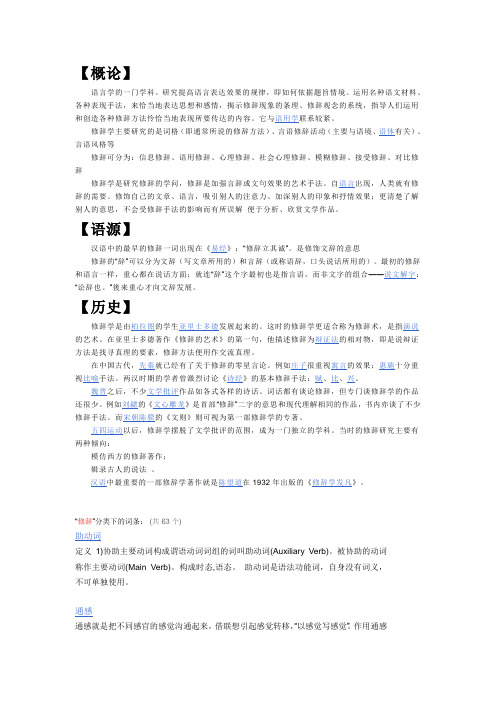
【概论】语言学的一门学科。
研究提高语言表达效果的规律,即如何依据题旨情境。
运用名种语文材料、各种表现手法,来恰当地表达思想和感情,揭示修辞现象的条理、修辞观念的系统,指导人们运用和创造各种修辞方法怜恰当地表现所要传达的内容。
它与语用学联系较紧。
修辞学主要研究的是词格(即通常所说的修辞方法)、言语修辞活动(主要与语境、语体有关)、言语风格等修辞可分为:信息修辞、语用修辞、心理修辞、社会心理修辞、模糊修辞、接受修辞、对比修辞修辞学是研究修辞的学问,修辞是加强言辞或文句效果的艺术手法。
自语言出现,人类就有修辞的需要。
修饰自己的文章、语言,吸引别人的注意力、加深别人的印象和抒情效果;更清楚了解别人的意思,不会受修辞手法的影响而有所误解便于分析、欣赏文学作品。
【语源】汉语中的最早的修辞一词出现在《易经》:“修辞立其诚”。
是修饰文辞的意思修辞的“辞”可以分为文辞(写文章所用的)和言辞(或称语辞,口头说话所用的)。
最初的修辞和语言一样,重心都在说话方面;就连“辞”这个字最初也是指言语,而非文字的组合——说文解字:“讼辞也。
”後来重心才向文辞发展。
【历史】修辞学是由柏拉图的学生亚里士多德发展起来的。
这时的修辞学更适合称为修辞术,是指演说的艺术。
在亚里士多德著作《修辞的艺术》的第一句,他描述修辞为辩证法的相对物,即是说辩证方法是找寻真理的要素,修辞方法便用作交流真理。
在中国古代,先秦就已经有了关于修辞的零星言论。
例如庄子很重视寓言的效果;惠施十分重视比喻手法。
两汉时期的学者曾激烈讨论《诗经》的基本修辞手法:赋、比、兴。
魏晋之后,不少文学批评作品如各式各样的诗话、词话都有谈论修辞,但专门谈修辞学的作品还很少。
例如刘勰的《文心雕龙》是首部“修辞”二字的意思和现代理解相同的作品,书内亦谈了不少修辞手法。
而宋朝陈骙的《文则》则可视为第一部修辞学的专著。
五四运动以后,修辞学摆脱了文学批评的范围,成为一门独立的学科。
当时的修辞研究主要有两种倾向:模仿西方的修辞著作;辑录古人的说法。
修辞格总论

学分册》)
▪ 分类: Nesfield认为修辞格主要有三大类,分别源于人类
心智的三大能力(the three chief faculties of the human intellect)从心理学上讲,修辞活动主要依赖人类的三种 联想能力
▪ 比较或对相似性的感知 (association by similarity)
e.g. The influence of the Crown has increased, is increasing, and outght to be diminished.
Definition and classification(3)
李鑫华, 2001:8-11)
▪ 依据所使用的语言手段分类
▪ Walter Nash’s system of classification
▪ A linguistic view on figures
Scheme (figures of syntax)
e.g.
Last night Japanese forces attacked Hong Kong. Last night Japanese forces attacked Guam. Last night Japanese forces attacked the Philippine Islands. Last night the Japanese attacked Wake Island. This morning the Japanese attacked Midway Island. e.g. They have mouths, but they speak not: Eyes have they, but they see not. They have ears, but they hear not: Noses have they, but they smell not. (Holy Bible: Psalm 115) e.g. When trouble comes in through the windows love goes out through the doors. (并非并列关系) Reading maketh a full man; conference a ready man; and writing an exact man. (of Studies by F. Bacon) (省略堆成)
修辞学Burke同的一论 戏剧五位一体论
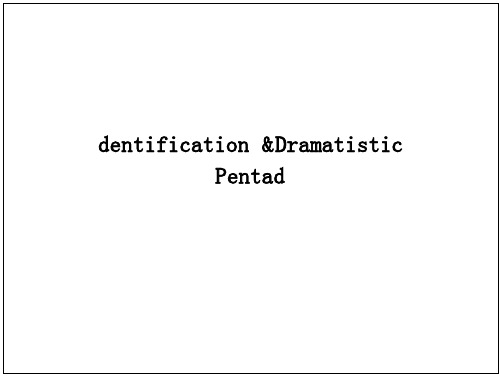
ldentification by antithesis
· Identification can be established on the condition that we have shared the same "enemy",which can be seen as the behavior of joining together to fight against the common enemy.
dentification &Dramatistic Pentad
Identification
"同一"(identification)的概念是伯克对修辞学定义 的主要延伸,"同一"来自于"实质"这一概念,自我由 各种实质或特性构成,包括物质、职业、朋友、行 为、信念和价值观等等。 当我们与他人享有某些 共同特质时,我们就取得了与他人的同一。 同 一 离不开"同体"(consubstantial),当两个实体在实质 上通过共同观点、态度、物质拥有或其它特性相 联系时,他们就是同体的。
· 正是通过修辞,我们能消除分离,实现同一与同体。在分离中, 我们可以发现修辞的基本动机,即人们进行交际以消除分离与 隔阂,正是因为有隔阂的存在,同一才有意义。
Dramatistic pentad
·The dramatistic pentad forms the core structure of dramatism,a method for examining motivations that the renowned literary critic Kenneth Burke developed.
修辞学绪论

咚咚咚,楼板一阵闷响,两个 汉子走上楼来。这两人一个又高又 瘦,手里提着一杆哨棒;另一个却 是又矮又胖,手里提着两把铁锤。 二人落座,那矮胖子拍着桌子叫道: “店家!上酒!要好酒!有甚好吃 的也只管将来!”店小二见他二人 提着兵器,面相凶恶,不敢怠慢, 忙不迭上来服侍。
三、修辞与语言三要素 语言包括语音、词汇、语法三个要素。修 辞学研究的是如何根据语言各个要素的构成、 特点、规律、规则等等,来提高表达效果。 他们之间的关系我们可以表示为:
语音 语义 第一平面
词汇 语法 第二平面
修辞 第三平面
她知道我们正打算报到。 她知道我们正打算报道。
刚才、钢材 攻克、功课 有利、有力 素材、塑材
不是所有修辞都一定要符合逻辑。 相反,有时,正因为“反逻辑”,而达 到某种修辞效果。例如:
“你很穷,穷得只剩下钱了”。 又如: “最熟悉的陌生人”。 再如: “与其短暂、苟且地活着,我宁愿 永存地死去。”
第三节
பைடு நூலகம்修辞与语境
语境就是语言环境。平时我们说话写 文章总得有特定的对象,特定的时间、 地点、场合,一定的题旨、语言本身的 具体环境;而且它不能离开更不能超越 特定的社会、时代背景。所有这一切都 是语言环境。 下面举一些利用不同的语境来提高 语言表达效果的例子:
20世纪最后20年,进入繁荣阶段。 主要代表作有:
李维琦:《修辞学》(湖南人民出版社1986) 宗廷虎等:《修辞新论》上海教育出版社1988 倪宝元:《汉语修辞新篇章》商务印书馆1992 王希杰:《修辞学新论》(北京语言出版社1993) 《修辞学通论》(南京大学出版社1996) 《修辞学导论》(浙江教育出版社2000) 沈谦:《修辞学》(台湾空中大学1995)
第一章修辞学概论

现代俄语(修辞学)授课教案第一章 修辞学概论修辞学与语音学、语法学、词汇学不同,它研究的不是语言系统的某一个层面,而是语言各个层面的语言手段的修辞色彩,以及如何根据言语目的、环境、对象选择使用恰当的语言手段,准确的表达思想感情。
语音学、语法学、词汇学解决言语对不对的问题,而修辞学解决言语好不好的问题。
如:打招呼,问候时可以说Здравствуйте!最普通的问候语;Добрый день!比较郑重;Здоро́во!语气随便,俚语;Привет, приветик, салют!用于关系亲密的熟人之间,尤其是年轻人。
请人吃饭时,说Кушайте на здоровье!表示客气,说Ешьте口气随便。
人死了,一般说у́мер, 用скончался表示对死者的尊敬,подохнуть原来指牲畜的死亡,用来指人时比较粗鲁。
修辞学正是把语言中的各种同义现象作为修辞手段为研究。
一、什么是修辞“修辞”一词的运用十分灵活,有时指修辞活动、修辞规律,有时指修辞现象。
我国古代使用的“修辞”一词的含义与我们今天不同。
南朝(南北朝)梁代的刘勰在《文心雕龙》一书中将修辞解释为“修饰文辞”,该书的书名中“文心”指文章的用心,即主要思想;“雕龙”则指文章雕刻龙纹般地精雕细刻,这是我国最早的一部修辞学著作,其中列举了各种文体及常用的修辞手段。
随着语言学的发展,修辞学研究范围扩大,现代修辞学突破了以往对“修辞”狭义的理解。
现代修辞学的奠基人陈望道(20世纪30年代)在《修辞学发凡》中认为应该从广义上理解修辞:“修”指调整或适用,“辞”指语辞解,修辞就是调整和适用语辞。
修辞的主旨是根据题旨(тема речи)和情境(ситуация речи)来调整言语,以适应交际的需要。
题旨指的是言语内容,话题;情境指交际的言语环境,如时间、对象、地点等因素。
俄语中将修辞学用стили́стика来称名。
“Стилистика —— это наука о формах наилучшего употребления языка в различных сферах общения, в различных видах речевой деятельности.”二、修辞学研究的内容1、语言单位修辞学(стилистика языковых единиц),挖掘语言各层面语言单位的修辞色彩,研究同义的语音、词汇、语法手段,这也是是实践修辞学(практическая стилистика)的主要研究内容,具有实践倾向和实用性质,指导学生的实际语言使用。
佩雷尔曼新修辞学的论式系统

一
l 2 l P 卜 佩 雷尔曼 的论 辩理 论 ( a r g u me n t a t i o n t h e o r y ) 备受忽视 的部分。事实上 , 正如沃尼克和克莱恩指 思 ?
出的 , 论 式 的分 类 系统 特 别 重 要 , 因为 它 给 我们 提供 让我们明白了论证者如何发展论证 , 论证的批评家如 而论 辩技 术 或论 式 了论式运作 的修辞学说明。在新修辞学之前 , 人们用 何 从 价值 为 中心 的视 角分析 论证 , 以描述 推论 模 式 的术 语 限 于 形 式 逻 辑 的模 式 ( 比 如 作 为一 种不 同 于分析 性 推 理 的辩 证 推理 便 是 呈 现 合 直言 、 选 言和假 言三段论 ) 和 标 准 归 纳 推 理 的 分 类 理性 的手 段 。
第 1期 2 0 1 4年 2月
篮法论
Zh e n g F a L un Co ng
No . 1
F e b. 1 0, 201 4
【 文章编号】 1 0 0 2 - _ 6 2 7 4 ( 2 0 1 4 ) 0 1 —1 1 5 _ - 0 9
佩雷尔 曼新 修辞学的论式 系统
李 杨 武宏 志
( 1 . 中南财经政 法大学法学院 , 湖北 武汉 4 3 0 0 7 3 ; 2 . 延安大 学 2 1 世 纪新逻辑研 究院 , 陕 西 延安 7 1 6 0 0 0 )
现代修辞学(一)
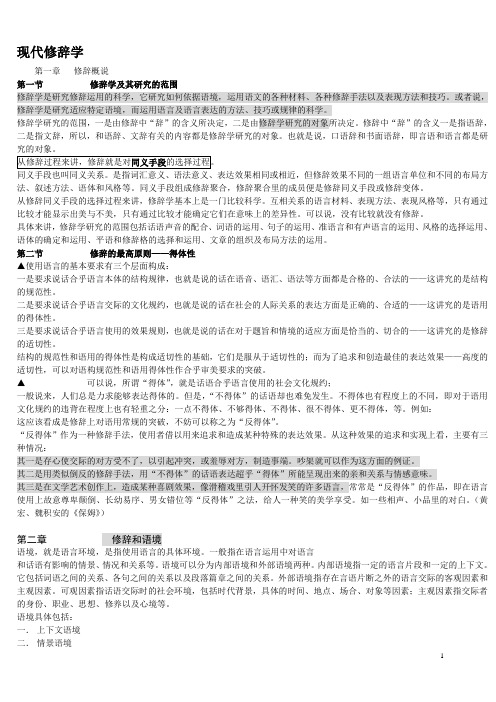
现代修辞学第一章修辞概说第一节修辞学及其研究的范围修辞学是研究修辞运用的科学,它研究如何依据语境,运用语文的各种材料、各种修辞手法以及表现方法和技巧。
或者说,修辞学是研究适应特定语境,而运用语言及语言表达的方法、技巧或规律的科学。
修辞学研究的范围,一是由修辞中“辞”的含义所决定,二是由修辞学研究的对象所决定。
修辞中“辞”的含义一是指语辞,二是指文辞,所以,和语辞、文辞有关的内容都是修辞学研究的对象。
也就是说,口语辞和书面语辞,即言语和语言都是研究的对象。
同义手段也叫同义关系。
是指词汇意义、语法意义、表达效果相同或相近,但修辞效果不同的一组语言单位和不同的布局方法、叙述方法、语体和风格等。
同义手段组成修辞聚合,修辞聚合里的成员便是修辞同义手段或修辞变体。
从修辞同义手段的选择过程来讲,修辞学基本上是一门比较科学。
互相关系的语言材料、表现方法、表现风格等,只有通过比较才能显示出美与不美,只有通过比较才能确定它们在意味上的差异性。
可以说,没有比较就没有修辞。
具体来讲,修辞学研究的范围包括话语声音的配合、词语的运用、句子的运用、准语言和有声语言的运用、风格的选择运用、语体的确定和运用、平语和修辞格的选择和运用、文章的组织及布局方法的运用。
第二节修辞的最高原则——得体性▲使用语言的基本要求有三个层面构成:一是要求说话合乎语言本体的结构规律,也就是说的话在语音、语汇、语法等方面都是合格的、合法的——这讲究的是结构的规范性。
二是要求说话合乎语言交际的文化规约,也就是说的话在社会的人际关系的表达方面是正确的、合适的——这讲究的是语用的得体性。
三是要求说话合乎语言使用的效果规则,也就是说的话在对于题旨和情境的适应方面是恰当的、切合的——这讲究的是修辞的适切性。
结构的规范性和语用的得体性是构成适切性的基础,它们是服从于适切性的;而为了追求和创造最佳的表达效果——高度的适切性,可以对语构规范性和语用得体性作合乎审美要求的突破。
罗兰_巴特新修辞理论的探讨及其启示(1)

罗兰_巴特新修辞理论的探讨及其启示(1)罗兰·巴特的新修辞理论的探讨与启示龙金顺[摘要]罗兰·巴特将修辞学与符号学紧密相连,不断地发展他的理论与观点,并且将其运用在更为广阔的领域。
本文从修辞学的角度来考察巴特的写作零度及其文本的分析,探讨他如何运用其理论和方法来指导对各种文本的阅读和写作,及其提供的许多思考与启示。
[关键词] 新修辞理论;写作的零度;文本分析;思考与启示引言二十世纪活跃在世界文坛上的法国文人罗兰·巴特(Roland Barthes)堪称是位杰出的修辞学家,但以往研究中将他看作是文学评论家、文学家、符号学家等等,在很大程度上忽视了他作为修辞学家的性质,由此,他留给世人的修辞学方面的启示尚且没有得到从分的认识。
有感于此,本文将从新修辞学角度解读巴特的部分作品,在正视和理解其修辞学理论的基础之上,感受他留给我们的相应启示。
上世纪30年代在欧美国家的兴起,60年代盛行的新修辞学突破了古典修辞学的“劝说”囿栏,将修辞扩展到语言学,社会学、人类学、逻辑学、哲学等领域,形成了修辞哲学。
它关注人类的交际行为,从认知的角度出发,认为“哪里有意义,哪里就有劝说”,这里“劝说”就是修辞。
而这种修辞不仅仅是口语和书面语言,还包括促销、求爱、绘画、建筑等等方面,可谓是人类行为的理论阐释。
罗兰巴特的学术生涯在那时正值发展和高峰期,受新修辞学的影响,巴特从语言学中吸取养分,甚至借用语言学的术语和概念来建构自己的符号学理论,他认为任何符号学系统都有言语介入,比如电影、广告、照片必须配以文字说明证实含义。
用符号学家的批评眼光看社会,他以创新的方法阅读文学作品,兼收并蓄语言学、心理学、社会学、逻辑学等领域大家的成果,表现出自己的新修辞学思想。
一:写作的零度与神话零度写作是罗兰·巴特欲达到的一个理想。
他每写一种书,几乎都创制一个理想,构织一个隐喻。
他的第一部作品《写作的零度》既是一部有关文学意识形态问题的研究,也是有关写作风格的探讨。
肯尼斯伯克新修辞学理论述评戏剧五位一体理论

肯尼斯伯克的新修辞学理论
伯克的新修辞学理论主要包括“戏剧五位一体”和“同一”理论。
“戏剧五位一体”理论将演讲比作戏剧,把演讲的各个部分,包括说话者、受 众、话题、语气和行为看作一个互相的整体。这个整体的不同部分可以相互影 响,从而影响受众对演讲的接受程度。
“同一”理论强调的是演讲者与受众之间的共同点和。这一理论可以帮助演讲 者更好地了解受众,从而更好地调整自己的演讲策略,更好地打动受众。
引言
随着服务业的快速发展,服务设计成为了一个备受的话题。服务设计是指通过 一系列有序、系统化的步骤,将服务理念转化为具体实践的过程。在这个过程 中,服务提供者需要五个关键要素,即服务设计五要素。同时,戏剧“五位一 体”理论也可以为服务设计提供新的研究视角和方法。本次演示将探讨服务设 计五要素的重要性和基于戏剧“五位一体”理论的研究方法,希望为服务设计 领域提供新的思路和指导。
然而,肯尼斯伯克的五位一体理论也存在一些不足之处:
1、理论依赖程度高:该理论需要使用者具备较高的文学素养和专业知识,否 则可能无法准确应用。
2、主观性强:在应用该理论时,往往需要依赖使用者的主观理解和判断,这 可能导致分析结果出现偏差。
3、难以量化:五位一体理论难以用具体的量化标准来衡量,这可能影响到其 在实践中的应用。
最后,米歇尔在演讲中很好地运用了“同一”理论。她通过讲述自己的亲身经 历和故事,与听众建立起共鸣。她谈到了自己的父母如何通过努力工作来为自 己创造更好的生活,这使得听众更容易理解她的观点,也更容易接受她的建议。
结论
肯尼斯伯克的新修辞学理论为分析米歇尔奥巴马的演讲提供了非常有价值的工 具。通过运用“戏剧五位一体”理论,我们可以看到米歇尔如何通过选择合适 的话题、语气和行为来吸引听众的注意力;通过运用“同一”理论,我们可以 看到米歇尔如何通过讲述自己的故事和经历来与听众建立共鸣。这些理论可以 帮助我们更好地理解演讲的背后动机和目的,从而更好地理解和接受演讲者的 观点。
修辞学概说
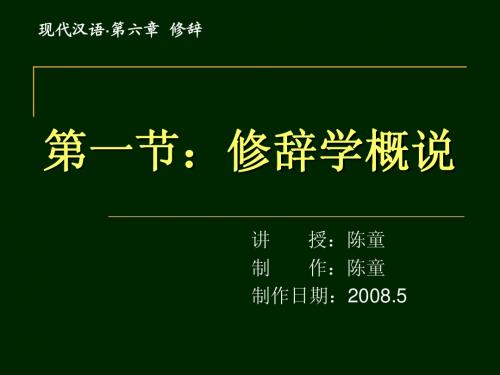
修辞与修辞学
修辞就是依据题旨情境,运用各种表现手法, 提高语言表达效果的一种活动。而研究这种提 高语言表达效果规律的科学就叫修辞学。
修辞学与语言学各个分支之间的关系
语言包含语音、词汇、语法三个要素。
语音学、词汇学、语法学是分别以语言的有关组 成部分为研究对象的。 修辞学和这三者不同,它所研究的是如何根据语 言各个要素的构成、特点、规律、规则等等,来 提高表达的效果 。
二、怎样学习修辞
在生活中学,在实践中学。 我们学习修辞,是为了提高语言文字的修养和 运用语言的能力,这是长期实践的结果,是一 个日积月累的工夫。 社会生活中人们的语言运用生动活泼,多姿多 彩,很值得我们学习、研究。 试比较以下两句话: (1)禁止践踏草地 (2)足下留青
第二节:词语的锤炼
第三节:句式的选择
掌握以下句式的特点和变换方法
一、长句与短句 二、整句与散句 三、肯定句与否定句 四、主动句与被动句 五、书面语句式和口语句式 六、常句式与变句式 七、完全句与省略句
四弟的绿庄园(节选)
秦文君
他仿佛也寻不到真心喜欢的东西,兴趣千种万 种变幻无穷,先是热衷于扮医生,往我肋上叩 几下,开张皱巴巴的药方。母亲大喜 ,紧忙 买回听诊器。谁知不几日他就移情于养蝌蚪, 拔下听诊器的橡皮管吸蝌蚪粪。
分析下列各组句子在韵律节奏方面区别: A1 大学问家写“小文章” 176位院士签协议写科普
书
a2 大学者写“小文章” 176位院士签协议写科普
书
b1老师讲课时应力求生动形象、富有情趣,使学生觉
得学习并非苦事,而是挺有兴趣的。
b2老师讲课事应力求生动形象、富有情趣,使学生觉
第1讲修辞概说1
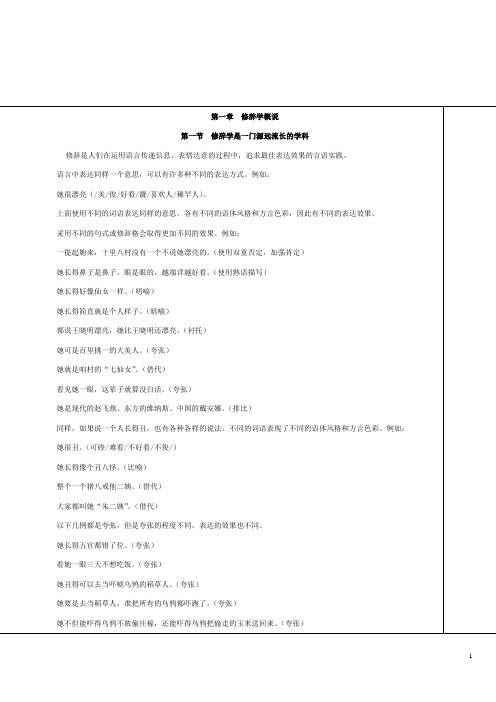
《毛诗序》的诞生是一件大事。它最早提出了诗有“六义”’即风、雅、颂、赋、比、兴。赋、比、兴作为三种不同的修辞手法,引起人们的注意。但《毛诗序》对此未作出具体说明。以后郑玄在《周礼注》中作了解释。他认为“赋之言铺,直铺陈今之政教善恶”;他还引了郑众的话来解释比兴:‘比者,比方于物也;兴者,托事于物也”。这种解释对后代影响很大。
魏文帝曹丕的《典论.论文》是我国最早谈论文体风格的著作,文章虽短,却很重要。
晋代陆机《文赋》的修辞理论,比起‘典论.论文》来,还要详细而系统些。例如在内容与形式的关系上,它阐述了内容是主干、形式是枝叶的观点,认为“意”是主要的“文”占第二位。如果“意不称物”,必然“文不逮意”。但他又强调了文采的重要,在指出文章的要务是“辞达”、“理举’,必须讲究通顺晓畅的同时,也论述了警策、比喻等表达技巧。文章后半部分强调技巧多了一些,强调内容不够,倒显得有些不足。他提出的文章音节必须和谐的观点对后人很有启发。
其次,王充提出了语文要通俗易懂、言文必须一致的观点。
先秦两汉在我们修辞学史上可以称萌芽时期,对后代修辞理论的发展起到了开创、先导作用。其中有不少关于修辞理论的探讨。如王逸《楚辞章句》:
《离骚》之文,依《诗》取兴,引类譬喻,故善鸟香草以配忠贞,恶禽臭物以比谗佞,灵脩美人以媲于君,宓妃佚女以譬贤臣,虬龙鸾凤以托君子,飘风云霓以为小人。
大家都叫她“朱二姨”。(借代)
以下几例都是夸张,但是夸张的程度不同,表达的效果也不同。
她长得五官都错了位。(夸张)
看她一眼三天不想吃饭。(夸张)
她丑得可以去当吓唬乌鸦的稻草人。(夸张)
她要是去当稻草人,准把所有的乌鸦都吓跑了。(夸张)
- 1、下载文档前请自行甄别文档内容的完整性,平台不提供额外的编辑、内容补充、找答案等附加服务。
- 2、"仅部分预览"的文档,不可在线预览部分如存在完整性等问题,可反馈申请退款(可完整预览的文档不适用该条件!)。
- 3、如文档侵犯您的权益,请联系客服反馈,我们会尽快为您处理(人工客服工作时间:9:00-18:30)。
From an art to theory
▪ Since Aristotle rhetoric has been faced itself with the task of
constructing theory. Though Aristotle saw the distinction between rhetoric and dialectics, he failed to peruse it in rhetorical theory as much as in rhetorical practice. His excessive emphasis on the practical function of rhetoric, the persuasive modes, results in the negligence of the theory construction. What Aristotle left us is not a rhetorical philosophy but a manual for speech strategies and argumentation (Natanson 133-139).
(彭炫和温科学,《外语教学》,2004) 2.1 A theory construction about language and meaning 2.2 intention and interpretation as the determinants of meaning 2.3 knowledge is created by argument
修辞学的哲学转向
修辞学的哲学转向是哲学的语言学转向的结果。 语言哲学:以语言为分析和研究对象的哲学学科。与科学哲学、
逻辑哲学、道德哲学并列。它着重从哲学的角度研究(1) 语言的本质、结构和一般特征,(2)研究语言同实在、思 维的关系,(3)研究各种表达式的指称和意义,(4)真 理和必然性,(5)意向性和言语行为,(6)理解和阐释 等问题。 当代,哲学转向了以语言为中心的概念分析,即哲学不去寻找 与概念相关的现象,如道德、正义与因果关系,或者确定概 念的理想存在形式,他们关心的是:概念的意义是什么,给 那些与概念有关的术语下定义以及谈论概念过程中出现的意 义问题。
▪ The theoretical development of contemporary rhetoric is owing
to the efforts of rhetoricians such as Richard M. Weaver and Maurice Natanson. Weaver believes that rhetoric is philosophic in that it connects itself with a branch of dialectics concerning choice and avoidance. With dialectics as the presupposition can rhetoric be of significance. Natanson decides the limits of rhetoric. Rhetoric should deal with the relationships between language and its reference, brain and consciousness, knowledge and some knowledge, etc.
epistemology (theory of knowledge, branch of philosophy that studies the origin and development of human knowledge); 2.4 ideology and power are extended through discourse 3. language is a social behavior: social turn of rhetoric (鞠玉梅,《川外》, 2003) 4. language is a social behavior: symbolic behavior (Kenneth Burke) 4. a theory of language: discourse-focused theory construction 5. effect-oriented 6. A comprehensive theory: no unified paradigm and interdisciplinary nature (Hu Shuzhong, 2002: 123)
当代西方修辞学概览
柴改英
内容
1. 当代西方修辞学的总体特征
从定义管窥 从历史考察 从论题了解
2. 当代西方修辞学的主要理论
理查兹的修辞哲学 (✓) 博克的戏剧主义(✓) 图尔明的论辩理论(✓) 福柯的话语理论
▪ 从定义管窥
Rhetoric has grown to encompass a theory of (1) language as a form of social behavior, (2) of intention and interpretation as the determinants of meaning ,(3) in the way that knowledge is created by argument, (4) and in the way that ideology and power are extended through discourse. In short rhetoric has become a comprehensive theory of language as effective discourse.
——Patricia Bizzell, etc., 1990: 899ห้องสมุดไป่ตู้
定义体现的特点
Rhetoric:
1. A turn from art to theory 2. Theoretical construction: philosophy-based (philosophical turn of rhetoric)
